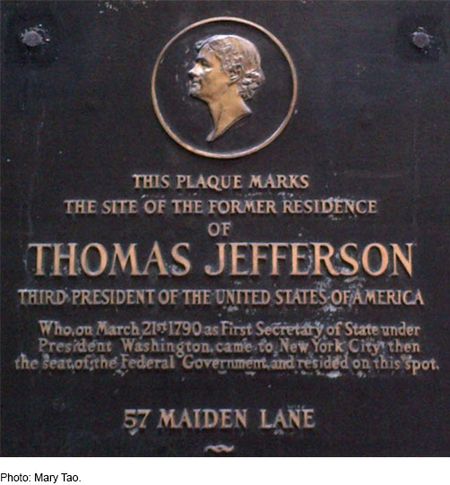Mary Tao
In a prior blog post, we saw how Maiden Lane evolved over time. It was here that a momentous event occurred in
1790, changing the history of the United States.
While serving as Secretary of State in 1790, Thomas
Jefferson rented a “mean house” at 57 Maiden Lane “for
106 pounds per year” and “not approving much of the stiff style and
etiquette of New York he gave up all his time to the establishment of his new
department, foreign affairs, and home.” There was much to occupy
Jefferson’s time while he was in residence here—in particular, the debt crisis
of 1790.
One June evening, Jefferson held a dinner
party at his Maiden Lane house. But this was no ordinary dinner. Among the
guests were Treasury Secretary Alexander Hamilton and James Madison, who were
on opposite sides of a hot political issue.
In his “Report on the Public
Credit, January 9, 1790,” Hamilton
proposed refinancing loans owed to foreign creditors,
funding the national debt with the issuance of new federal bonds, assumption of
state debts incurred
from the Revolutionary War, and an excise tax to pay for the assumption. Hamilton
felt that his plan would help to establish America’s
credit both domestically and abroad.
The combined foreign and domestic debts made up just over $54
million.
Both the debt funding plan and the debt assumption plan met
with opposition. Hamilton’s argument for funding the national debt won him the
votes he needed; however, he faced a much tougher battle over the assumption
plan. The opposition stemmed from the fact that some states owed more than
others: Delaware owed $50,000
while South Carolina owed $5 million, with the total of all state debt equal to
$25 million. Some states, in particular the southern ones, felt that they would
be subsidizing the other states under Hamilton’s plan. Madison, a Virginian,
strongly opposed Hamilton’s plan and blocked the motion each time it came up
for a vote in Congress.
While talks had been ongoing for months, the final compromise
was supposedly hashed out at this dinner party. Philadelphia would replace New
York as the country’s capital for a period of ten years. This gave Hamilton a
chance to win over Pennsylvania’s vote, but he had to defend his action to New York’s
representative. To appease the southern states, a new town between Virginia
and Maryland would eventually become the permanent U.S. capital. In exchange
for moving the capital south, Madison would get Hamilton the votes he needed
for his debt assumption proposal. The dinner party compromise led to both the Residence Act of
1790 and the Funding
Act of 1790.
The residence at 57 Maiden Lane no longer exists. A plaque
marks the spot where the house once stood, with no hint of the drama that
unfolded there on June 20, 1790.
Disclaimer
The views expressed in this post are those of the author and do not necessarily reflect the position of the Federal Reserve Bank of New York or the Federal Reserve System. Any errors or omissions are the responsibility of the author.

Mary Tao is a research librarian in the Federal Reserve Bank of New York’s Research and Statistics Group.












 RSS Feed
RSS Feed Follow Liberty Street Economics
Follow Liberty Street Economics
The USA’s first “bailout” was harder to negotiate than the last one.